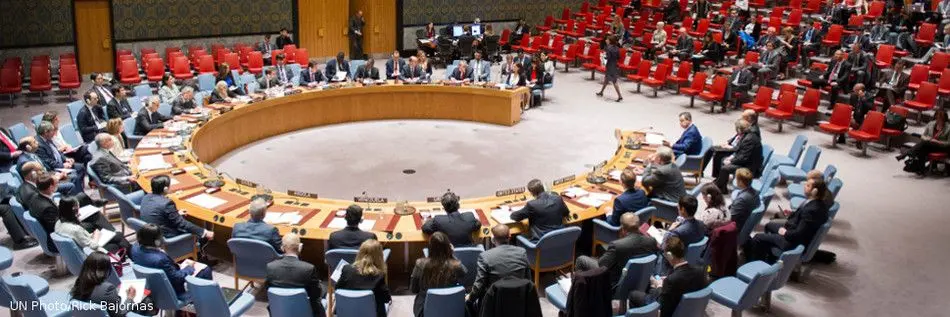
The United Nations Security Council from an Organizational Perspective
Project Description
In this long-term project, the United Nations Security Council is analysed as an organization. The project has been partly funded by the German Research Foundation (DFG) and the German Peace Research Foundation (DSF). The Security Council is authorized to make formally binding decisions with very far reaching implications for world politics, including the authorization of the legitimate use of force and the imposition of mandatory economic sanctions in case of threats to international peace and security. While it is formally an organ of the United Nations Organization, its decisions arise from the interaction of its member states, in particular the permanent five members. They are hardly influenced by interaction with other UN organs, including the UN Secretariat. For this reason, the Security Council is a perfect object to study the evolution and effects of organizational rationales in member-dominated international organizations. We expect that organizational structures evolve that are difficult to evade even for the world’s most powerful states and may significantly influence collective decisions.
The aim of the project is to identify the evolution and effects of organizational rationales that produce collective decisions, which cannot be explained by the aggregation of member states’ preferences, even though all decisions are exclusively made by the member states. (1) If repeated collective decisions are informed by precedents and previous cases in similar situations, doctrines and practices evolve that guide later decisions. These doctrines and practices may shape and constrain the room for pursuing case-specific preferences even of powerful member states. (2) The delegation of implementation decisions to sanctions committees fundamentally reshapes the institutional setting, in which member states operate. It divides governance in complementary functions fulfilled by the Council and its committees and may foster the emergence of consistent and norm-guided decision-making, even though sanctions committees are composed of all Security Council member states. Accordingly, Security Council decisions cannot always be explained exclusively by knowing only the preferences of member states and formal decision rules. Hence, the organization gains influence, or autonomy, although all collective decisions arise from interaction of member states.
Selected Publications
D?rfler, Thomas und Thomas Gehring (2021): Analogy-based collective decision-making and incremental change in international organizations, In: European Journal of International Relations, Early View.
Hosli, Madeleine O., and Thomas D?rfler (2020): The United Nations Security Council: History, Current Composition, and Reform Proposals; in: The Changing Global Order. Springer, Cham, 2020. 299-320.
Thomas D?rfler und Thomas Gehring (2019): Constitutive Mechanisms of UN Security Council Practices. Precedent Pressure, Ratchet Effect and Council Action Regarding Intrastate Conflicts; in: Review of International Studies, 45:1, 120-140.
Thomas Gehring, Christian Dorsch und Thomas D?rfler (2019): Precedent and Doctrine in Organisational Decision-making: The Power of Informal Institutional Rules in the United Nations Security Council’s Activities on Terrorism; in: Journal of International Relations and Development, 22:1, 107-135.
D?rfler, Thomas (2019): Security Council Sanctions Governance: The Power and Limits of Rules. Routledge.
Dorsch, Christian, and Thomas D?rfler (2019): Organized Hypocrisy of the International Community: An Institutionalist Explanation of the UN Security Council’s Contradictory Activity on Darfur. In: Zeitschrift für Genozidforschung, Vol 15, No. 1-2, 8-31.
Becker, Manuel, Thomas Gehring und Thomas D?rfler (2018): Credible commitment without independent regulatory agent: Evidence from the Security Council's United Nations Compensation Commission. In: Regulation & Governance, Vol. 12, No. 3, 395-412.
Becker, Manuel (2017): Reparationszahlungen im UN-Sicherheitsrat. Verfahrensregeln für ein sachgerechtes Kompensationssystem. In: Zeitschrift für Internationale Beziehungen. Vol. 24, No. 1, 68-99.
D?rfler, Thomas, Thomas Gehring, Manuel Becker (2017): Complex Governance Structures and Rule-based Decision-making within the UN Security Council; Forschung DSF N? 43, Osnabrück. Link bundesstiftung-friedensforschung.de/blog/forschung-dsf-no-43/
Stollenwerk, Eric; Thomas D?rfler und Julian Schibberges (2016): Taking a New Perspective: Mapping the Al Qaeda Network Through the Eyes of the UN Security Council. In: Terrorism and Political Violence. Vol 28, No. 5 (2016), 950-970.
Dorsch, Christian und Thomas Gehring (2015): Institutionelle Opportunit?tsstrukturen im Weltsicherheitsrat. Wie Doktrinen und andere Vorentscheidungen das Handeln der Mitgliedstaaten und die kollektiven Entscheidungen über den Eingriff in innerstaatliche Konflikte beeinflussen. In: Politische Vierteljahresschrift 56 No. 4, 599-625.
D?rfler, Thomas und Thomas Gehring (2015): Wie internationale Organisationen durch die Strukturierung von Entscheidungsprozessen Autonomie gewinnen. Der Weltsicherheitsrat und seine Sanktionsausschüsse als System funktionaler Ausdifferenzierung. In: Politische Vierteljahresschrift 49 (Sonderheft), 30-56.
Dorsch, Christian (2014): A New Barometer for the Evolution of Multilateral Counterterrorism: Introduction to the Materials, Methods, and Results of the UN Security Council & Terrorism Dataset (UNSC-TDS). In: Terrorism and Political Violence, Vol. 27, No. 4, 701-721.
Gehring Thomas und Thomas D?rfler (2013): Division of Labor and Rule-based Decisionmaking Within the UN Security Council: The Al-Qaeda/Taliban Sanctions Regime. In: Global Governance, Vol. 19, No. 4, 567-587.